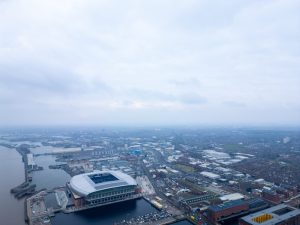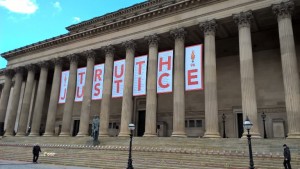Liverpool City Council is to extend its flagship Culture and Arts Investment Programme (CAIP) for a further 12 months, ensuring continued support for the city’s vibrant cultural sector through to March 2027.
A report to last night’s Cabinet (16 September) outlines the need to extend the current three-year cycle for an additional year, requiring one-off funding of £2.245million. Following engagement with the 29 arts organisations it funds, the Council recognises the financial pressures many are facing, including rising costs and reduced reserves, and the extension will help safeguard the sector while a more strategic and inclusive approach to future funding is developed.
Adding another 12 months to the funding agreement will bring it in line with timescales for Arts Council England’s funding cycle, making it easier for the city’s cultural sector to plan strategically. The decision is now subject to final budget approval in March 2026.
The additional time will also allow for the development of a refreshed CAIP process – which will be informed by the Arts Council England review, the UK Government’s Spending Review, and proposed devolution changes. It will also align with the brand new Liverpool Culture Strategy which is set to be unveiled later this year.
Since its launch in 2023, CAIP has delivered significant impact:
- Generating around £33 million in economic value to the local economy
- Supporting over 4,000 jobs
- Attracting over 3.4 million attendances in 2023/24 alone.
Projections for 2025/26 suggest the 29 funded organisations will generate nearly £41 million in turnover and deliver more than 12,000 events citywide.
The funded organisations are:
20 STORIES HIGH, Africa Oyé, BlackFest Ltd, The Bluecoat, Collective Encounters, The Comedy Trust, DaDa Fest, FACT Liverpool, First Take, The Florence Institute Trust (The Florrie), Homotopia, Liverpool Arab Arts Festival, Liverpool Biennial of Contemporary Art, Liverpool Irish Festival, LMTT Everyman and Playhouse, One Latin Culture Ltd – trading as Luma Creations, Metal Culture, Milap, Open Eye Gallery, Pagoda Arts, Royal Court Liverpool Trust Ltd, Royal Liverpool Philharmonic Society, Squash Liverpool CIC, Tate Liverpool, Tmesis Theatre, Unity Theatre, Writing on the Wall, Melt, Sole Rebel.
Liverpool City Council’s Cabinet Member for Health, Wellbeing & Culture, Councillor Harry Doyle, said:
“Liverpool’s cultural sector is one of our greatest assets – economically, socially and creatively. It plays a vital role in shaping our city’s identity, bringing communities together, and driving innovation and opportunity.
“Extending CAIP for another year is a sensible and necessary step to protect jobs, sustain community engagement, and give our cultural organisations the certainty they need to plan ahead. It reflects our commitment to supporting the sector through challenging times – something we are incredibly proud of – and by aligning it with other potential pots of national funding, we’re creating a more strategic and joined-up approach to investment which can only benefit our wonderful arts organisations.
“We will continue to do everything we can to ensure our cultural sector thrives and continues to reflect the diversity and creativity of Liverpool.”
Director and Chief Executive of FACT, Nicola Triscott, said:
“This CAIP extension provides vital stability for FACT to deliver life-enhancing digital and screen art experiences for audiences from across Liverpool, while nurturing the next generation of digital artists, creators and filmmakers. We’re grateful for Liverpool City Council’s investment, which enables us to contribute to the city’s thriving creative economy.”
Chief Executive, Royal Liverpool Philharmonic, Vanessa Reed, said:
“We are deeply grateful to Liverpool City Council for extending our vital funding for another year. Without the Council’s longstanding support we would not be able to fulfil our mission to transform lives through music – whether on stage at Liverpool Philharmonic Hall, in schools, hospitals, or in communities across the city. We also value the City Council’s acknowledgement of our economic impact as the largest music industry employer in the city region. We create jobs, drive tourism and support local businesses, increasing wellbeing and developing skills. The City Council’s support of Liverpool’s vibrant arts and creative economy enables all this life enhancing activity to happen.”












